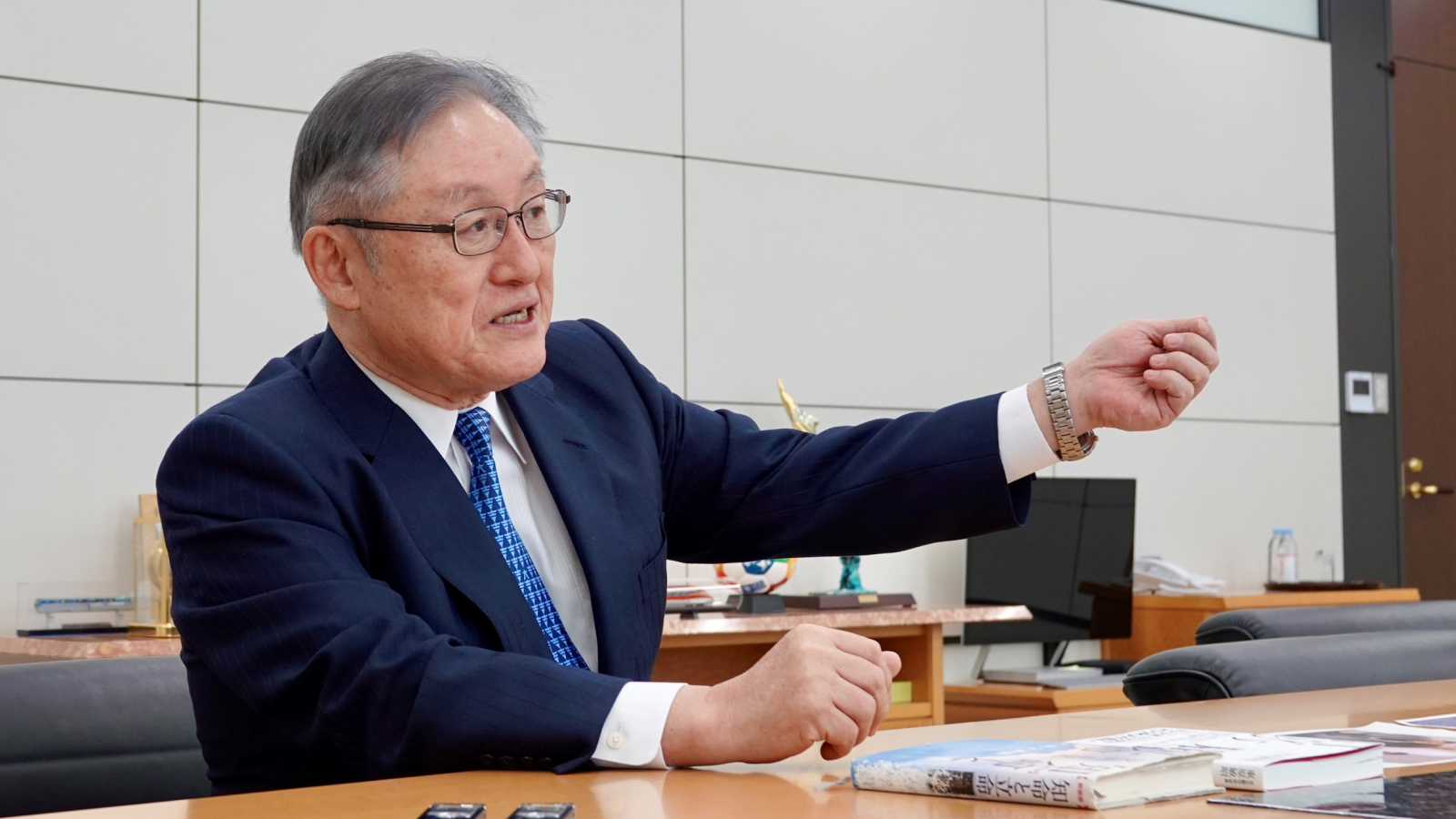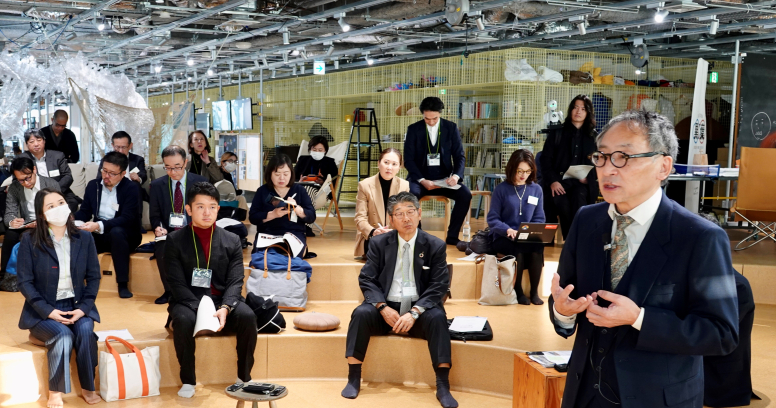【Relay Interview 3】 Toshiaki Higashihara, Executive Chairman, Hitachi, Ltd.: Management is not possible without philosophy—Participation in establishing KIP to “create a better future”

We talked with the key members of Kyoto Institute of Philosophy (KIP) for a series of interview articles to find out how they came to start the activity and their thoughts on future plans. For the third in the series of interviews with KIP Directors, we met with Toshiaki Higashihara, Executive Chairman of the Hitachi, Ltd.
Details
Interviewer: Please tell us how you became involved with the KIP.
Higashihara: I was invited by NTT Executive Chairman Jun Sawada. Hitachi is now engaged in the Social Innovation Business that uses digital technology to upgrade social infrastructure systems, such as railroads and power transmission and distribution systems, to improve the quality of life. Our goal is to achieve a "Human-centered society in which no one is left behind.” When I was thinking about what the future of society would look like, Mr. Sawada told me about the establishment of the institute. They are trying to realize a “Multilayered Society of Values” where individuals respect each other and share diverse value systems, thinking about “What constitutes true happiness?” I thought their objective has something in common with our view of future society and it would be a good opportunity for me to join the institute.
Interviewer: You have been aware that there are issues we need to address .
Higashihara: The industrial sector has concentrated on manufacturing products until now. But now the industrial sector needs to address social challenges such as how to reduce CO2 emissions, how to minimize plastic waste and how to reduce food loss.
We believe there are three important things here. The first is ownership mindset. For example, think for yourself about what you are going to do with the plastic bottles after use. The second important thing is empathy. In order to launch initiatives around the world, it is necessary to understand the culture, religion, and background of the people you are working with. The third is inclusiveness. Social issues cannot be addressed by yourself. It is important to involve NPOs and other organizations as well as individuals.
Interviewer: In Hitachi City, Ibaraki Prefecture, where Hitachi was founded, your company is taking on the challenge of recreating a city using digital technology in cooperation with the municipal government. It seems to me that this project is the first movement of what you call “Activities involving citizens.”
Higashihara: In December 2023, we concluded a comprehensive cooperation agreement with the city under the title of "Smart City” project. We first developed the vision of future city, then go ahead with the plan. Now I want to come up with something that gives an extra boost to the project, something that makes the residents of Hitachi City feel they are making a great contribution to society through this project. If we can set some kind of performance indicators and evaluate the achievement of objectives, it may motivate them to try harder.
I think the direction that the KIP is headed in is the same as ours. People with various values share the thought that "We need to put aside our differing views since we need to work together to tackle these global issues" and participate in specific initiatives. I hope that the concept developed by the KIP will eventually be included in Hitachi City's co-creation project.
Interviewer: You talked previously about empathy and that can be linked to “Altruism” you referred to in your book “Breaking Down Silos—The Transformation of Hitachi.”
Higashihara: The words Namihei Odaira, the founder of Hitachi, left behind include “Be honest,” which means a lot to us. More than 110 year after he founded the company, current management feels as if we are asked "Are you sure that the decision is made for the benefit of company and society rather than of yourself?" and “Are you being honest?" when making each decision.
But when people are asked whether they can forsake themselves to do something for others, which would be the ultimate altruism, they would say that is something hard to do in reality (laughs). That is why I ask employees to come up with something that will be win-win for the other person and win-win for themselves. Thinking about other person's benefit means "thinking from the other person's point of view. In a sense, that is empathy.
Interviewer: We heard that an increasing number of business leaders are becoming more and more conscious of social contribution.
Higashihara: I feel that along with the increase, they are divided into two extremes. There are still quite a few entrepreneurs and investors who are short-term thinkers. On the other hand, there is a gradual increase in the number of entrepreneurs and investors who believe that we should look at social and environmental values from long term and broad perspective. Or rather, we come to realize that increasing number of people claim that companies should pursue, for example, wellbeing (a state of mental and physical health and happiness) and the question of "What happiness means" for the future.
However, for those who are struggling to make ends meet on a daily basis, putting food on the table is more important than discussing above topics. I believe that we should discuss how to build an ideal society working in parallel to correcting social and economic disparities.
Interviewer: Markus Gabriel, Professor of Philosophy at the University of Bonn in Germany, who serves as the Senior Global Advisor of KIP advocates "ethical capitalism" that places ethics as a universal value at the core of economic activities.
Higashihara: After reading "The Theory of Moral Sentiments" by Adam Smith, the father of modern economics, I strongly felt that ethics should be the foundation of capitalism. I believe that it is very important to manage a company with ethics.
On the other hand, we no longer live in an era where it is sufficient to think of corporate management only in terms of human beings, or in terms of workers and capitalists. From now on, robots and AI will be integrated into the physical world. I think we need to think about multiple layers of values that include not just the values of human beings but also those of robot and AI.
For example, in a corporate management meeting, it is not enough for top managers to listen only to the opinions of human executives but also to the opinions of AI1, AI2, and AI3 to be able to make an ethical decision in the end. The opinion of each AI depends on its background data, so management must have the ability to know each AI's uniqueness to make decisions. This is not an easy task.
Another thing that managers need to be aware of is that even if they think they are “correct” at the time they make their decision, they may not be so five years after since ethical standards might change. So what is needed is the ability to make adjustments and to listen to the opinions of those who have different views. Japanese people know how their absolute belief was shattered by the World War II. What people think is right changes with the times. In that sense, ethics is also living.
Interviewer: Have you always been familiar with philosophy?
Higashihara: Yes, I do. I also like Western philosophy, Kant for example. But Western philosophy, broadly speaking, is centered on "dialogue with God.” People have dialogue with God to decide what they should be and what they should do. I have a belief that decision-making is not a one-person operation but a process that requires a partner, which I think is influenced by Oriental culture. The word “human being” in Japanese is expressed with Japanese characters meaning “between people.” I think my view is very close to Eastern philosophy.
Interviewer: You are also known as a voracious reader.
Higashihara: One of my favorite books is Chimei to Ritsumei (Lectures on Human Studies) by the philosopher Masahiro Yasuoka. “Chimei” means to recognize why you were born here and why you do your work. “Ritsumei” means to carry out the mission given to you. What I learned from this book is that if you work hard to undertake the mission, your “fate” will turn into “destiny” and you can make your “destiny” more favorable.
If we compare these to the initiatives of the KIP, “Chimei” is the fact that we joined the Institute because we recognized that “without philosophy, the time will come when management will no longer be viable.” And the Kyoto Conference to be held this fall is “Ritsumei” in the sense of carrying out the mission given to us. If we can create empathy with the participants at the conference and expand the scope of our activities to the world, the “destiny” of all of us will be favorable in the future. That’s what I believe.
Others



